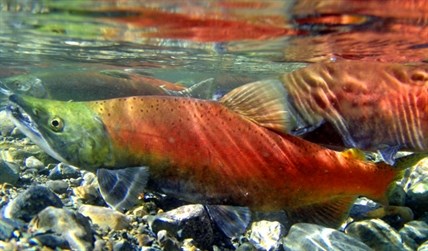
Image Credit: www.fishwithjd.com
September 19, 2014 - 12:16 PM
OKANAGAN - The Okanagan Nation Alliance is a stakeholder in a new B.C. research project looking at how population growth is affecting freshwater fisheries.
It's hoped the research will offer insight into how freshwater fisheries can be better informed and subsequently managed.
The project is funded in part by Genome B.C., but is also supported by the Okanagan Nation Alliance, the B.C. Ministry of Forests and B.C. Hydro. Findings could guide the development of best practices management and policy for the environment and fisheries and help stakeholders make decisions.
"Applying genomics to migratory sockeye and native kokanee salmon will allow us to better monitor stock health in the face of active management, including population supplementation with hatchery fish," project leader Dr. Michael Russello said in a media release. Russello is an associate professor in UBC Okanagan's Department of Biology.
"In addition to stock delineation and prioritization of stocks for conservation, the project should contribute new knowledge for enhancing the effectiveness of hatchery programs," Russello said.
Freshwater fisheries are an integral part of B.C.'s social and economic fabric. Direct, indirect and induced impacts of sport fishing totals more than $950 million. Kokanee, a freshwater form of sockeye salmon, supports very popular recreational fisheries in lakes across the Okanagan and the Pacific Northwest. It is also a traditional food source for First Nations. Over 500,000 kokanee salmon were caught last year.
"This project demonstrates the willingness of stakeholders to collaborate and partner to improve fisheries outcomes," President and CEO of Genome B.C., Dr. Alan Winter said. "Genome BC is proud to play a catalytic role in bringing these groups together in an effort to bring new knowledge to freshwater fisheries management in BC."
This project, valued at $285,000 was funded through Genome B.C.'s User Partnership Program. The program is designed to form partnerships with users to find research solutions that address the needs of the key sectors of the B.C. economy and directly connect receptors in B.C. economic sectors to new products, services, and practices that arise from genomics-related research. There will be an initial investment of $9 million for new research projects, with $3 million from Genome B.C. The remaining funds are provided by end-user stakeholders and other co-funders.
More information about Genome B.C. can be found on their website.
News from © iNFOnews, 2014